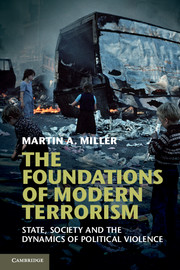Book contents
- Frontmatter
- Contents
- Acknowledgments
- 1 Writing the history of terrorism
- 2 The origins of political violence in the pre-modern era
- 3 Trajectories of terrorism in the transition to modernity
- 4 Nineteenth-century Russian revolutionary and tsarist terrorisms
- 5 European nation state terrorism and its antagonists, at home and abroad, 1848–1914
- 6 Terrorism in a democracy: the United States
- 7 Communist and fascist authoritarian terror
- 8 Global ideological terror during the Cold War
- 9 Toward the present: terrorism in theory and practice
- Bibliography
- Index
- References
3 - Trajectories of terrorism in the transition to modernity
Published online by Cambridge University Press: 05 December 2012
- Frontmatter
- Contents
- Acknowledgments
- 1 Writing the history of terrorism
- 2 The origins of political violence in the pre-modern era
- 3 Trajectories of terrorism in the transition to modernity
- 4 Nineteenth-century Russian revolutionary and tsarist terrorisms
- 5 European nation state terrorism and its antagonists, at home and abroad, 1848–1914
- 6 Terrorism in a democracy: the United States
- 7 Communist and fascist authoritarian terror
- 8 Global ideological terror during the Cold War
- 9 Toward the present: terrorism in theory and practice
- Bibliography
- Index
- References
Summary
The eighteenth century witnessed further refinements in the discourse on political violence which both accompanied the transformative events of the French Revolution and its aftermath as well as, at the same time, providing conceptual tools to understand these paradigm shifts. Between the conclusion of the Thirty Years War in 1648 and the death of Louis XIV in 1715, national monarchies had largely succeeded in taming the passions of the religious conflicts between Catholics and Protestants, and had created vast networks of loyal functionaries who gradually broke down many of the deeply rooted feudal practices in the provinces on behalf of the centralizing governments. In addition, perhaps most significantly, the monarchs essentially demilitarized the territory under royal authority by abolishing the private militias formerly responsible to powerful regional lords. If Max Weber is correct in defining the stability of the modern state as requiring superiority in the use of legitimate force, it is in this period that such a reality took concrete shape. In a parallel trend at work at the same time, the notion of absolutist monarchical government, as conceptualized by Jean Bodin and ultimately realized by Cardinal Richelieu in France, sought to conclusively end the regional and religious competitiveness of the past over the control of political authority by creating a sense of consensual acceptance (if not agreement) on sovereign rule by a central and supreme legitimate power, or what Charles Taylor has called the “social imaginary” of the nation.
As the legal and moral parameters of the state expanded, the government bureaucracy gradually gained supremacy over a growing system of surveillance and regulation that replaced the vanishing provincial forms of authority. Imperial ordinances, regulatory acts and codes of punishment were either legislated or decreed across the continent, from St Petersburg, where Peter the Great founded his new Russian capital, to the centers of Hapsburg and Bourbon authority, which both mobilized and controlled the subjects of their realms. Kings and emperors were to monopolize supreme positions of authority within clearly delimited territories, while projecting a pervasive presence throughout the territory, all intended to fashion a unified social order, free of the feudal disparities in landholding practices, trade, currency, taxes, and military power.
Information
- Type
- Chapter
- Information
- The Foundations of Modern TerrorismState, Society and the Dynamics of Political Violence, pp. 32 - 57Publisher: Cambridge University PressPrint publication year: 2012
